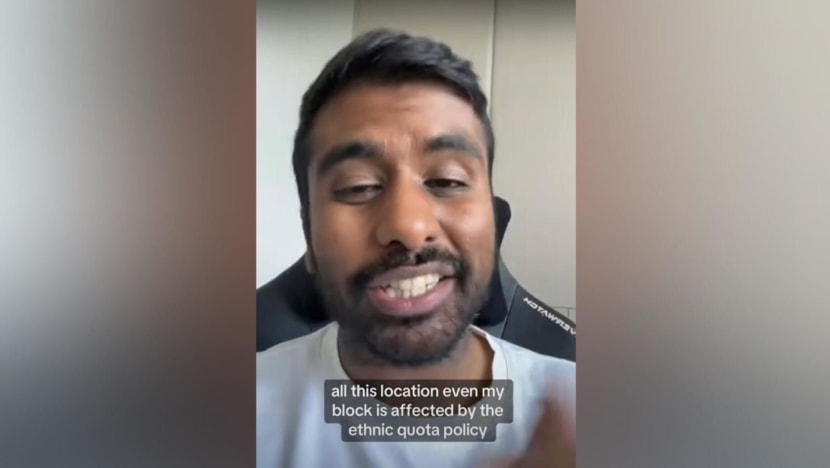Property agent issued POFMA order over false claims about ethnic integration housing policy
ERA Realty Network said it will be taking the "appropriate action" against the property agent.

A screengrab of a YouTube video that was posted by property agent Shaik Amar on Jul 25, 2024.

This audio is generated by an AI tool.
SINGAPORE: A property agent was on Thursday (Aug 1) issued a correction order under the Protection from Online Falsehoods and Manipulation Act (POFMA) over a recent video he shared on social media regarding the Ethnic Integration Policy (EIP).
In his video that was posted on his TikTok and Instagram pages on Jul 24 and his YouTube account a day later, Shaik Amar made false and misleading claims over the EIP, said the Ministry of National Development (MND).
Minister for National Development Desmond Lee instructed the POFMA Office to issue a correction direction to Mr Shaik in relation to the video.
Mr Shaik, who goes by "thatproperty.guy" on social media, was required to carry correction notices on his Instagram, Facebook and YouTube accounts. According to property portals PropertyGuru and 99.co, he is a realtor with ERA Realty Network.
These notices must state that the video posted on Jul 24 and Jul 25 contained false and misleading statements. A link to the government’s clarification must also be provided.
"This will allow viewers to consider both versions and draw their own conclusions," said the MND.
While the ministry noted that Mr Shaik had taken down the video on TikTok and Instagram, it was still up on his YouTube account.
It added there is "a need to address the falsehoods that may have been circulating amongst the public as a result of the publication of these videos".
A check by CNA showed that as of 3.45pm on Thursday, the video on YouTube was still public and had garnered 163 views. Mr Shaik had also put up correction notices on his three social media pages.
In response to CNA's queries on Thursday, ERA's key executive officer Eugene Lim said that they are aware of Mr Shaik's posts on social media.
"We assure our clients and the public that this agent's views do not reflect ERA's views," said Mr Lim.
"We take this matter very seriously and will be taking the appropriate action. Additionally, we have and will reinforce with all our salespersons the importance of maintaining the highest standards of professionalism in all communications."
He added: "ERA is committed to upholding accuracy and integrity, and we will continue to support and educate our salespersons to prevent similar issues in the future."
AGENT "BENEFITED FROM EIP"
An article published on the government's fact-checking website Factually explained why Mr Shaik's claims were false.
Mr Shaik had claimed that the EIP offers no benefit to ethnic minority households and only "causes them significant financial detriment when they sell their flats".
"The EIP was introduced to prevent racial enclaves and ensure racial diversity in Housing and Development Board (HDB) neighbourhoods in support of racial harmony," the article said.
"Because of the EIP, a defined proportion of flats are set aside for ethnic minority communities in all HDB developments (including more popular ones) through its Build-To-Order (BTO) and Sale of Balance Flats (SBF) exercises and through open booking.
"This is a significant benefit because the EIP guarantees that a specified minimum number of flats in HDB estates, including in highly sought after estates, are available for persons from minority communities."
What is the Ethnic Integration Policy?
The EIP was introduced in 1989 to prevent ethnic clusters or enclaves from forming in Singapore.
It sets quotas for the number of flats owned by each racial group in an HDB block and neighbourhood. The quota is applied during the purchase of flats.
When the limit for an ethnic group is reached, a flat cannot be sold to a household of that ethnicity. For resale transactions, this means the buyer and seller must be of the same ethnic group.
Mixed race households can choose their household ethnic classification based on either the applicant's race or their spouse's.
Buyers can use the HDB website to check if they are eligible to purchase an HDB resale flat in a particular block or neighbourhood.
Some flat listings also indicate if they are open for sale to all ethnicities or if there are EIP restrictions.
When the EIP was introduced in 1989, the limits for each block were 87 per cent for Chinese, 25 per cent for Malays and 13 per cent for Indians and other races.
The limits for each neighbourhood were 84 per cent for Chinese, 22 per cent for Malays and 10 per cent for Indians and other minority groups.
In 2010, the quotas for Indians and other races were revised to 15 per cent in blocks and 12 per cent in neighbourhoods. The quotas for Chinese and Malays remained the same.
Sellers can appeal to waive the EIP limits if they find it difficult to sell their flats. In 2022, HDB received 411 EIP-related appeals from flat owners, of which about a third were successful.
While flats in more popular areas are generally higher priced, the "significant government subsidies given by HDB make them affordable".
The article said: "Mr Shaik Amar himself benefited from the EIP, because his household would not have been able to select an SBF flat if there was no EIP."
"During the SBF exercise where his household had booked their SkyOasis @ Dawson flat, all minority first-timer applicants were invited to select a three-room flat in Queenstown, including Mr Shaik Amar’s household."
"In comparison, only about 40 per cent of Chinese first-timer applicants were invited to select a flat because of the Chinese EIP limit."
MND noted that the value of flats at SkyOasis @ Dawson had also "appreciated significantly".
SkyOasis @ Dawson is a replacement flat located at Queenstown under the Selective En bloc Redevelopment Scheme (SERS).
The article said that the proportion of owners from minority communities in more popular developments could be significantly lower without the EIP in place, even at point of sale by HDB.
"The EIP, in this way, generally enables more households from the minority communities to benefit from the increase in value that takes place when a flat bought from HDB is resold at a higher price."
It added it is "misleading to focus on the point of resale, without setting out that flats are first obtained within the framework of the EIP".
"Further, the EIP applies not just at the point of purchase of flats at HDB’s sales exercises, but also at point of resale. This ensures that no ethnic group is excluded from any public housing neighbourhood, even over time."
The article noted nearly one in three HDB blocks, and 11 per cent of HDB neighbourhoods have reached their EIP limits.
"Without the EIP, over time, we may see fewer flat owners from the minority communities in highly sought after housing estates. This would be detrimental to the minority communities," it said.
MEASURES IN PLACE TO HELP EIP-CONSTRAINED OWNERS
It also clarified the false claim in the video that the EIP causes all minority households to suffer significant detriment when they sell their flats.
"The government has publicly acknowledged that for a small number of EIP-constrained flat owners, at point of resale, there can be differences in the prices that a potential Chinese buyer might be willing to pay, compared with a potential buyer from the minority communities."
It noted that there are measures implemented by HDB to help EIP-constrained flat owners, such as giving them more time to sell their existing flat if they have purchased another one and waiving the EIP limits in "exceptional circumstances".
HDB also introduced a scheme in 2022 to buy back flats from eligible EIP-constrained flat owners who face genuine difficulties selling their flats.
Called the EIP Buyback Assistance Scheme, it provides flat owners who are genuinely constrained by EIP limits with the fallback option of selling their flats to HDB at a fair price, based on prevailing market conditions.
"Households will need to have owned their flats for at least 10 years and the flats should have been marketed at reasonable prices for at least six months," said MND.
Those with extenuating circumstances can appeal to HDB for special consideration to waive these conditions.
The flats bought back by HDB will be offered for sale through SBF exercises or open booking of flats and HDB will give a significant subsidy to the assessed market value of the flat to determine the sale price.
"Where Chinese EIP limits are reached, only buyers from the minority communities will be eligible to buy such flats, and they will benefit from the subsidies, like other buyers," MND added.
"Ultimately, the EIP has ensured that no HDB neighbourhood in Singapore is exclusive to any single ethnic group and has thus achieved very real benefits for the minority communities."
On Mr Shaik's Amar claim that the EIP was introduced in the 1960s and has not been changed since, the article clarified that the policy was introduced in 1989 and has been adjusted over the years.
For example, HDB announced in 2010 that the EIP limit for Indians/Others would be increased by 2 per cent, from 10 per cent to 12 per cent at the neighbourhood level, and from 13 per cent to 15 per cent at the block level.


















